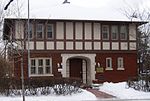Canada–Democratic Republic of the Congo relations are the bilateral relations between Canada and the Democratic Republic of the Congo. Canada has an embassy in Kinshasa and D.R. Congo has an embassy in Ottawa.
While the Canadian government provided in 2009 US$40 million in development aid to the DRC, Canadian companies held US$4.5 billion in mining-related investments there, making the DRC the first or second-largest African destination for Canadian mining activities at the end of the 2000s. The Government of Canada has reported 28 Canadian mining and exploration companies operating in the D.R. Congo between 2001 and 2009, of which four (Anvil Mining, First Quantum Minerals, Katanga Mining, Lundin Mining) were engaged in commercial-scale extraction, with their collective assets in the DRC ranging from Cdn.$161 mill. in 2003 up to $5.2 bill. in 2008, and these companies were supported in 2009 by Canadian and Quebec public pension plan investments of Cdn.$319 mill. Natural Resources Canada valued Canadian mining assets in the DRC at Cdn.$2.6 bn. in 2011.In 2010, Canada's temporary delay and abstention from a World Bank decision to cancel most of the D.R. Congo's external debt and complete the review of the DRC's Extended Credit Facility, was officially based on Canadian concerns over reform sustainability adversely affecting DRC's investment climate and development objectives. While Canada's actions drew criticism from the Congolese government, diplomatic relations were not deemed to have been impaired.
Canada also expressed concerns over the DRC's relations with Canadian companies, and the abstention was reportedly linked directly to First Quantum's legal proceedings.In addition to a total of 2,200 Canadian military personnel deployed to Congolese and Zairean conflicts during 1960–1964 and 1996, individual Canadians have had significant roles in the history of the Congo, including:
Leading the military conquest of the Katanga region for Belgium's King Leopold II in 1891: William Grant Stairs.
Printing, from 1903 to 1908, the very first books to be published in the Lingala language, a language which became a lingua franca of the D.R. Congo, with 25 million speakers worldwide: Mère Marie-Bernadette.
Leading diplomatic and military missions of the United Nations to Zaire and the D.R. Congo during the 1990s and 2000s: Raymond Chrétien, 1996; Maurice Baril, 1996 and 2003; Philip Lancaster, 2008–2009 and 2010.
Political counsel to President Laurent Kabila during 1997–1998: former Canadian Prime Minister Joe Clark.
Plotting, unsuccessfully, an overthrow of Laurent Kabila's government in 1998: Robert Stewart.
Management and partial privatization of the D.R. Congo's national mining company, Gécamines, 2005–2009: Paul Fortin.
Legal representation for former military leader Laurent Nkunda against allegations of war crimes at a military tribunal in Rwanda, 2009–2010: Stéphane Bourgon.










